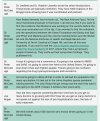eN0ch
New Member
My covid conspiracy theorist friend asked me to watch the full almost-3-hours video of Joe Rogan's interview with Peter McCullough (mid-December 2021). She said it captures so well the entirety of what she believes about covid vaccines, and she'd like me to watch it so I might understand why she believes what she does, whether I accept it or not. As an expression of loyal friendship I agreed to do so. (Although she was happy with my compromise of reading the transcript rather than watching the video). It was insufferable to endure, but I did it.
Given that she's placed significant trust in him, I'm looking for good verifiable evidence that might raise questions for her. I'm wondering if anyone here has done some investigation of him or his claims? Or if not, can anyone point to generally useful resources for investigating claims made by antivax medical professionals?
Among my specific questions / lines of enquiry so far:
Given that she's placed significant trust in him, I'm looking for good verifiable evidence that might raise questions for her. I'm wondering if anyone here has done some investigation of him or his claims? Or if not, can anyone point to generally useful resources for investigating claims made by antivax medical professionals?
Among my specific questions / lines of enquiry so far:
- he claims to be an epidemiologist (as well cardiologist, nephrologist and internal medicine specialist). The latter three seem to stack up, with several appointments, published work etc in his resume. But as to "Epidemiologist", the only thing I can find is a 2-year masters degree in Public Health, in epidemiology and statistics. No record of specialist practice or research in that field. That doesn't look like "Epidemiologist" to me. But is there a way to nail the claim objectively?
- he claims the pandemic was planned, citing some conference or course at Johns Hopkins University in 2017 (but no reference a person could look up to verify). He says the conference foreshadowed a pandemic in 2025, or something such. Does anyone know how one might verify that one?
- there are several others, but I haven't got to those yet

